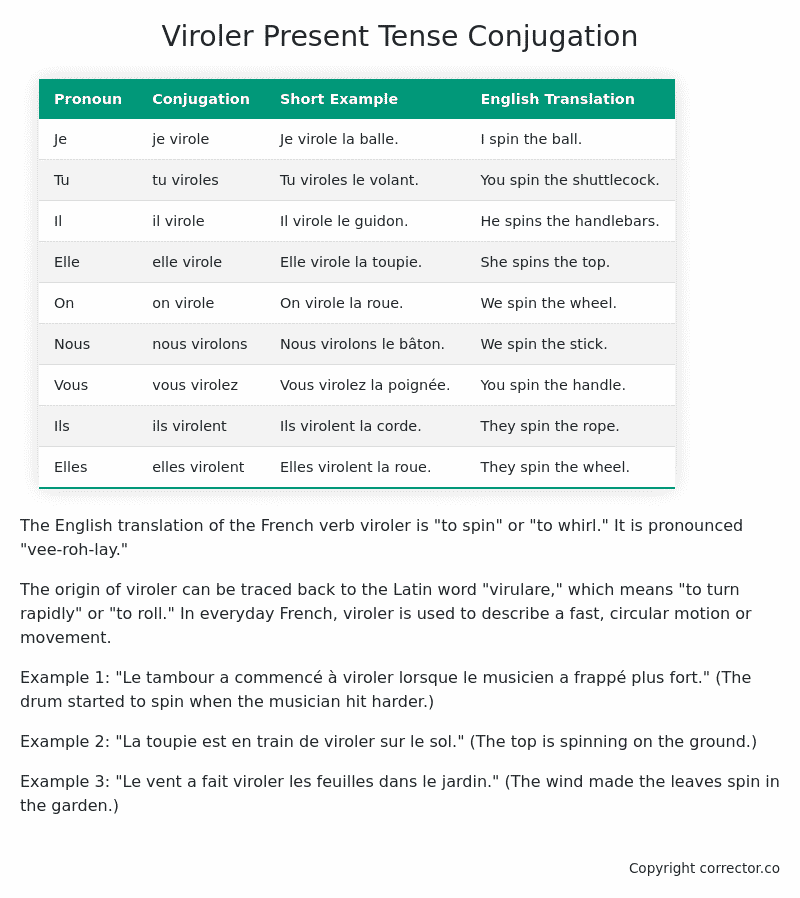Le Present (Present Tense) Conjugation of the French Verb viroler
Introduction to the verb viroler
The English translation of the French verb viroler is “to spin” or “to whirl.” It is pronounced “vee-roh-lay.”
The origin of viroler can be traced back to the Latin word “virulare,” which means “to turn rapidly” or “to roll.” In everyday French, viroler is used to describe a fast, circular motion or movement.
Example 1: “Le tambour a commencé à viroler lorsque le musicien a frappé plus fort.” (The drum started to spin when the musician hit harder.)
Example 2: “La toupie est en train de viroler sur le sol.” (The top is spinning on the ground.)
Example 3: “Le vent a fait viroler les feuilles dans le jardin.” (The wind made the leaves spin in the garden.)
Viroler – About the French Present Tense
To take a deep dive into all the French tenses then see our article on Mastering French Tense Conjugation.
Common Everyday Usage Patterns For Le Present
Interactions with Other Tenses
Table of the Present Tense Conjugation of viroler
| Pronoun | Conjugation | Short Example | English Translation |
|---|---|---|---|
| Je | je virole | Je virole la balle. | I spin the ball. |
| Tu | tu viroles | Tu viroles le volant. | You spin the shuttlecock. |
| Il | il virole | Il virole le guidon. | He spins the handlebars. |
| Elle | elle virole | Elle virole la toupie. | She spins the top. |
| On | on virole | On virole la roue. | We spin the wheel. |
| Nous | nous virolons | Nous virolons le bâton. | We spin the stick. |
| Vous | vous virolez | Vous virolez la poignée. | You spin the handle. |
| Ils | ils virolent | Ils virolent la corde. | They spin the rope. |
| Elles | elles virolent | Elles virolent la roue. | They spin the wheel. |
Other Conjugations for Viroler.
Le Present (Present Tense) Conjugation of the French Verb viroler (this article)
Imparfait (Imperfect) Tense Conjugation of the French Verb viroler
Passé Simple (Simple Past) Tense Conjugation of the French Verb viroler
Passé Composé (Present Perfect) Tense Conjugation of the French Verb viroler
Futur Simple (Simple Future) Tense Conjugation of the French Verb viroler
Futur Proche (Near Future) Tense Conjugation of the French Verb viroler
Plus-que-parfait (Pluperfect) Tense Conjugation of the French Verb viroler
Passé Antérieur (Past Anterior) Tense Conjugation of the French Verb viroler
Futur Antérieur (Future Anterior) Tense Conjugation of the French Verb viroler
Subjonctif Présent (Subjunctive Present) Tense Conjugation of the French Verb viroler
Subjonctif Passé (Subjunctive Past) Tense Conjugation of the French Verb viroler
Subjonctif Imparfait (Subjunctive Imperfect) Tense Conjugation of the French Verb viroler
Subjonctif Plus-que-parfait (Subjunctive Pluperfect) Tense Conjugation of the French Verb viroler
Conditionnel Présent (Conditional Present) Tense Conjugation of the French Verb viroler
Conditionnel Passé (Conditional Past) Tense Conjugation of the French Verb viroler
L’impératif Présent (Imperative Present) Tense Conjugation of the French Verb viroler
L’infinitif Présent (Infinitive Present) Tense Conjugation of the French Verb viroler
Struggling with French verbs or the language in general? Why not use our free French Grammar Checker – no registration required!
Get a FREE Download Study Sheet of this Conjugation 🔥
Simply right click the image below, click “save image” and get your free reference for the viroler Present Tense tense conjugation!

I hope you enjoyed this article on the verb viroler. Still in a learning mood? Check out another TOTALLY random French verb present conjugation!


